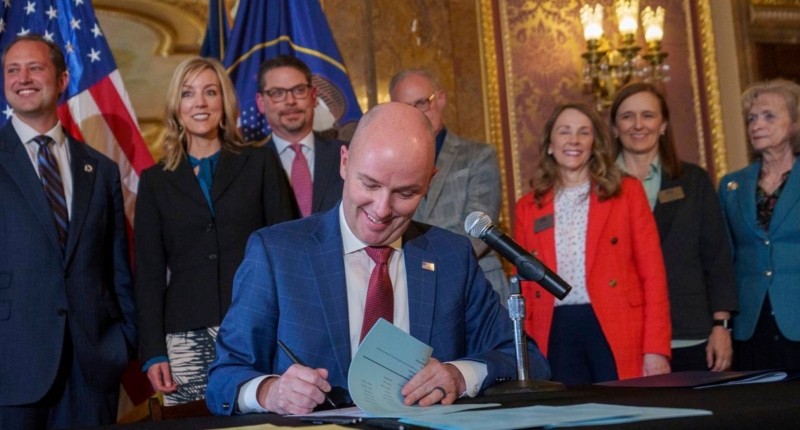Utah has passed two laws aimed at regulating minors’ access to social media platforms, requiring parental consent and age verification for signing up to social media sites like TikTok and Instagram. The laws also prohibit minors from using social media between 10:30 pm and 6:30 am and seek to prevent companies from luring kids with addictive features. While children’s advocacy groups like Common Sense Media have hailed the laws, tech industry lobbyists argue they are unconstitutional and infringe on people’s right to exercise the First Amendment online. Utah’s focus on children’s access to information online is not new, having previously passed a law that called on tech companies to block porn on devices sold. While similar legislation is being developed in other states, some argue that Utah’s laws do not go far enough in addressing the root problem of social media’s harmful data collection and design practices. The laws are set to take effect in March 2024, and Governor Spencer Cox has anticipated legal challenges from social media companies.
Utah has set a new precedent by signing into law a bill that aims to limit teenagers’ access to social media platforms, becoming the first state in the US to do so. Governor Spencer Cox signed two measures that require parental consent before children can sign up for social media sites such as TikTok and Instagram. The new laws also prevent children under the age of 18 from using social media between 10:30 pm and 6:30 am, and seek to prevent technology companies from using addictive features to lure children to their platforms. Age verification will also be required for anyone wishing to use social media in Utah.
Utah’s Republican-supermajority Legislature’s laws represent the latest trend in the changing attitudes towards technology companies among politicians, even within pro-business Republican states. For over a decade, companies like Facebook and Google have enjoyed unbridled growth, but concerns over user privacy, hate speech, misinformation, and the harmful effects of social media on teenagers’ mental health have led lawmakers to rein them in.
Although several states have similar proposals in the works, including Arkansas, Texas, Ohio, and Louisiana, as well as New Jersey, Utah is the first to take concrete steps towards regulating social media. In contrast, California has already enacted a law barring tech companies from profiling children or using their personal information in ways that could harm them mentally or physically.
Apart from requiring parental consent, social media companies would need to design new features to comply with the new regulations. These features would prevent them from promoting ads to minors and showing them in search results. TikTok, Snapchat, and Meta, which owns Facebook and Instagram, are among the companies that make most of their money by targeting advertising to their users.
It is not clear how Utah and other states plan to enforce the new regulations. Social media companies are already prohibited from collecting data on children under 13 without parental consent under the federal Children’s Online Privacy Protection Act. Nonetheless, children can still sign up for social media platforms, both with and without their parents’ permission. Governor Cox cited studies that demonstrate how time spent on social media leads to “poor mental health outcomes” for children.
Utah has taken the lead in regulating minors’ access to social media by passing two laws that require parental consent and age verification before signing up for social media platforms like TikTok and Instagram. The laws also prohibit minors from using social media between 10:30 pm and 6:30 am and aim to prevent companies from luring kids with addictive features. Utah’s laws represent the latest attempt by lawmakers to rein in big tech’s unbridled growth amid concerns over user privacy, hate speech, misinformation, and the effects of social media on young people’s mental health.
Jim Steyer, the CEO and founder of Common Sense Media, a nonprofit focusing on kids and technology, welcomed the laws aimed at reining in social media’s addictive features, saying it “adds momentum for other states to hold social media companies accountable to ensure kids across the country are protected online.” However, Steyer expressed concern about the other bill that gives parents access to children’s social media posts, saying it “deprives kids of the online privacy protections we advocate for.”
Although similar legislation is being developed in California and New Jersey, some argue that Utah’s new laws do not go far enough in addressing the root problem, namely, the harmful data collection and design practices of social media companies. The laws are set to take effect in March 2024, but tech industry lobbyists have already criticized them as unconstitutional, saying they infringe on people’s right to exercise the First Amendment online.
Utah’s focus on children and the information they can access online is not new. Two years ago, Utah passed a law that called on tech companies to automatically block porn on cell phones and tablets sold, citing the dangers it posed to children. However, concerns about enforcement led lawmakers to revise the bill to prevent it from taking effect unless five other states passed similar laws.
Governor Spencer Cox has previously said he expects social media companies to challenge Utah’s laws in court. Despite concerns about how the laws will be enforced, Common Sense Media’s Steyer believes that the safety and mental well-being of kids and teens depend on legislation like this to hold big tech accountable for creating safer and healthier experiences online.
Don’t miss interesting posts on Famousbio










